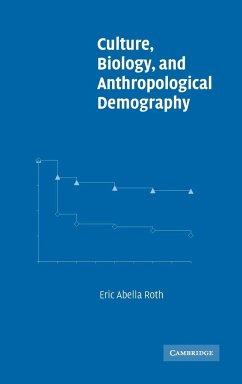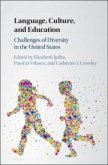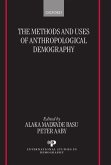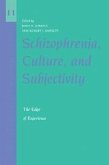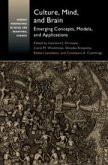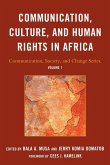Eric Abella Roth
Culture, Biology, and Anthropological Demography
Eric Abella Roth
Culture, Biology, and Anthropological Demography
- Gebundenes Buch
- Merkliste
- Auf die Merkliste
- Bewerten Bewerten
- Teilen
- Produkt teilen
- Produkterinnerung
- Produkterinnerung
Two distinctive approaches to the study of human demography exist within anthropology today--anthropological demography and human evolutionary ecology. Eric Roth reconciles these approaches through recognition of common research topics and the construction of a broad theoretical framework incorporating both cultural and biological motivation.
Andere Kunden interessierten sich auch für
![Language, Culture, and Education Language, Culture, and Education]() Language, Culture, and Education137,99 €
Language, Culture, and Education137,99 €![Anthropological Perspectives on Tooth Morphology Anthropological Perspectives on Tooth Morphology]() Anthropological Perspectives on Tooth Morphology175,99 €
Anthropological Perspectives on Tooth Morphology175,99 €![The Anthropological Lens The Anthropological Lens]() James L. PeacockThe Anthropological Lens88,99 €
James L. PeacockThe Anthropological Lens88,99 €![The Methods and Uses of Anthropological Demography (Isd) The Methods and Uses of Anthropological Demography (Isd)]() Alaka Malwade Basu / Peter Aaby (eds.)The Methods and Uses of Anthropological Demography (Isd)263,99 €
Alaka Malwade Basu / Peter Aaby (eds.)The Methods and Uses of Anthropological Demography (Isd)263,99 €![Schizophrenia, Culture, and Subjectivity Schizophrenia, Culture, and Subjectivity]() Janis Hunter Jenkins / Robert John Barrett (eds.)Schizophrenia, Culture, and Subjectivity139,99 €
Janis Hunter Jenkins / Robert John Barrett (eds.)Schizophrenia, Culture, and Subjectivity139,99 €![Culture, Mind, and Brain Culture, Mind, and Brain]() Culture, Mind, and Brain152,99 €
Culture, Mind, and Brain152,99 €![Communication, Culture, and Human Rights in Africa Communication, Culture, and Human Rights in Africa]() Communication, Culture, and Human Rights in Africa71,99 €
Communication, Culture, and Human Rights in Africa71,99 €-
-
-
Two distinctive approaches to the study of human demography exist within anthropology today--anthropological demography and human evolutionary ecology. Eric Roth reconciles these approaches through recognition of common research topics and the construction of a broad theoretical framework incorporating both cultural and biological motivation.
Hinweis: Dieser Artikel kann nur an eine deutsche Lieferadresse ausgeliefert werden.
Hinweis: Dieser Artikel kann nur an eine deutsche Lieferadresse ausgeliefert werden.
Produktdetails
- Produktdetails
- Verlag: Cambridge University Press
- Seitenzahl: 232
- Erscheinungstermin: 4. November 2004
- Englisch
- Abmessung: 235mm x 157mm x 17mm
- Gewicht: 493g
- ISBN-13: 9780521809054
- ISBN-10: 0521809053
- Artikelnr.: 21229971
- Herstellerkennzeichnung
- Libri GmbH
- Europaallee 1
- 36244 Bad Hersfeld
- gpsr@libri.de
- Verlag: Cambridge University Press
- Seitenzahl: 232
- Erscheinungstermin: 4. November 2004
- Englisch
- Abmessung: 235mm x 157mm x 17mm
- Gewicht: 493g
- ISBN-13: 9780521809054
- ISBN-10: 0521809053
- Artikelnr.: 21229971
- Herstellerkennzeichnung
- Libri GmbH
- Europaallee 1
- 36244 Bad Hersfeld
- gpsr@libri.de
Eric Abella Roth is Professor of Anthropology in the Department of Anthropology, University of Victoria, and an Affiliate, Center for Studies in Demography and Ecology, University of Washington-Seattle. He has conducted demographic anthropological fieldwork in the Canadian Subarctic, the Sudan and northern Kenya. He has published in various journals, including American Anthropology, American Journal of Physical Anthropology, Human Biology, Human Ecology, Journal of Anthropological Research, and Social Sciences and Medicine. He is co-editor of the text, African Pastoralist Systems: An Integrated Approach (1994, Lynne Rienner).
Part I. Anthropological Demography and Human Ecological Behavioural Ecology: 1. Two solitudes
2. Why bother?
3. Anthropological demography: culture, not biology
4. Human evolutionary ecology: biology, not culture
5. Discussion: cultural and biological reductionism
Part II. Reconciling Anthropological Demography and Human Evolutionary Ecology: 6. Common ground
7. Demographic strategies
8. Reproductive interests: social interactions, life effort and demographic strategies: a Rendille example
9. Sepaade as male mating effort
10. Rendille primogeniture as a parenting strategy
11. Summary: demographic strategies as links between culture and biology
Part III. Mating Effort and Demographic Strategies: 12. Mating effort as demographic strategies
13. Cross-cultural mating strategies: polygyny and bridewealth, monogamy and dowry
14. Bridewealth and the matter of choice
15. Demographic and cultural change: values and morals
16. The end of the sepaade tradition: behavioral tracking and moral change
Part IV. Demographic Strategies as Parenting Effort: 17. Parenting effort and the theory of allocation
18. The Trivers-Willard model and parenting strategies
19. Parity-specific parental strategies: the case of primogeniture
20. Local resource competition model
21. Infanticide and child abandonment: accentuating the negative
22. Adoption in modern China: stressing the positive
23. Summary: culture and biology in parental effort
Part V. Future Research Directions: 24. The central place of sex in anthropology and evolution
25. Male sexuality, education and high risk behavior
26. Final ground: demographic transitions
Part VI. References Cited.
2. Why bother?
3. Anthropological demography: culture, not biology
4. Human evolutionary ecology: biology, not culture
5. Discussion: cultural and biological reductionism
Part II. Reconciling Anthropological Demography and Human Evolutionary Ecology: 6. Common ground
7. Demographic strategies
8. Reproductive interests: social interactions, life effort and demographic strategies: a Rendille example
9. Sepaade as male mating effort
10. Rendille primogeniture as a parenting strategy
11. Summary: demographic strategies as links between culture and biology
Part III. Mating Effort and Demographic Strategies: 12. Mating effort as demographic strategies
13. Cross-cultural mating strategies: polygyny and bridewealth, monogamy and dowry
14. Bridewealth and the matter of choice
15. Demographic and cultural change: values and morals
16. The end of the sepaade tradition: behavioral tracking and moral change
Part IV. Demographic Strategies as Parenting Effort: 17. Parenting effort and the theory of allocation
18. The Trivers-Willard model and parenting strategies
19. Parity-specific parental strategies: the case of primogeniture
20. Local resource competition model
21. Infanticide and child abandonment: accentuating the negative
22. Adoption in modern China: stressing the positive
23. Summary: culture and biology in parental effort
Part V. Future Research Directions: 24. The central place of sex in anthropology and evolution
25. Male sexuality, education and high risk behavior
26. Final ground: demographic transitions
Part VI. References Cited.
Part I. Anthropological Demography and Human Ecological Behavioural Ecology: 1. Two solitudes
2. Why bother?
3. Anthropological demography: culture, not biology
4. Human evolutionary ecology: biology, not culture
5. Discussion: cultural and biological reductionism
Part II. Reconciling Anthropological Demography and Human Evolutionary Ecology: 6. Common ground
7. Demographic strategies
8. Reproductive interests: social interactions, life effort and demographic strategies: a Rendille example
9. Sepaade as male mating effort
10. Rendille primogeniture as a parenting strategy
11. Summary: demographic strategies as links between culture and biology
Part III. Mating Effort and Demographic Strategies: 12. Mating effort as demographic strategies
13. Cross-cultural mating strategies: polygyny and bridewealth, monogamy and dowry
14. Bridewealth and the matter of choice
15. Demographic and cultural change: values and morals
16. The end of the sepaade tradition: behavioral tracking and moral change
Part IV. Demographic Strategies as Parenting Effort: 17. Parenting effort and the theory of allocation
18. The Trivers-Willard model and parenting strategies
19. Parity-specific parental strategies: the case of primogeniture
20. Local resource competition model
21. Infanticide and child abandonment: accentuating the negative
22. Adoption in modern China: stressing the positive
23. Summary: culture and biology in parental effort
Part V. Future Research Directions: 24. The central place of sex in anthropology and evolution
25. Male sexuality, education and high risk behavior
26. Final ground: demographic transitions
Part VI. References Cited.
2. Why bother?
3. Anthropological demography: culture, not biology
4. Human evolutionary ecology: biology, not culture
5. Discussion: cultural and biological reductionism
Part II. Reconciling Anthropological Demography and Human Evolutionary Ecology: 6. Common ground
7. Demographic strategies
8. Reproductive interests: social interactions, life effort and demographic strategies: a Rendille example
9. Sepaade as male mating effort
10. Rendille primogeniture as a parenting strategy
11. Summary: demographic strategies as links between culture and biology
Part III. Mating Effort and Demographic Strategies: 12. Mating effort as demographic strategies
13. Cross-cultural mating strategies: polygyny and bridewealth, monogamy and dowry
14. Bridewealth and the matter of choice
15. Demographic and cultural change: values and morals
16. The end of the sepaade tradition: behavioral tracking and moral change
Part IV. Demographic Strategies as Parenting Effort: 17. Parenting effort and the theory of allocation
18. The Trivers-Willard model and parenting strategies
19. Parity-specific parental strategies: the case of primogeniture
20. Local resource competition model
21. Infanticide and child abandonment: accentuating the negative
22. Adoption in modern China: stressing the positive
23. Summary: culture and biology in parental effort
Part V. Future Research Directions: 24. The central place of sex in anthropology and evolution
25. Male sexuality, education and high risk behavior
26. Final ground: demographic transitions
Part VI. References Cited.

